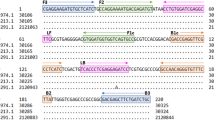Abstract
TISSUES from lung, urogenital, and intestinal tract which cannot be obtained sterile represent a problem to the isolation and establishment of cell lines.
This is a preview of subscription content, access via your institution
Access options
Subscribe to this journal
Receive 51 print issues and online access
$199.00 per year
only $3.90 per issue
Buy this article
- Purchase on Springer Link
- Instant access to full article PDF
Prices may be subject to local taxes which are calculated during checkout
Similar content being viewed by others
References
Heilman, D. H., Proc., Soc. Exp. Biol. and Med., 60, 365 (1945); Biol. Abstr., 20, No. 10573 (1946).
Gey, G. O., Gey, M. K., Inui, F., and Vedder, H., Johns Hopkins Hosp. Bull., 77, 116 (1945).
Hu, D. Funan, J. Inv. Derm. 26/1, 23 (1956).
Paul, John, Cell and Tissue Culture, second ed., 124 (Williams and Wilkins Co., Baltimore, 1960).
Perlman, D., Giuffre, N. A., and Brindle, S. A., Proc. Soc. Exp. Biol. and Med., 106, 880 (1961).
Author information
Authors and Affiliations
Rights and permissions
About this article
Cite this article
SCHNEIDER, H., BROWN, J. & MUIRHEAD, E. Use of Fungizone and Polymyxin B in Isolation of Naturally Infected Tissues. Nature 195, 396–397 (1962). https://doi.org/10.1038/195396a0
Issue Date:
DOI: https://doi.org/10.1038/195396a0
Comments
By submitting a comment you agree to abide by our Terms and Community Guidelines. If you find something abusive or that does not comply with our terms or guidelines please flag it as inappropriate.


